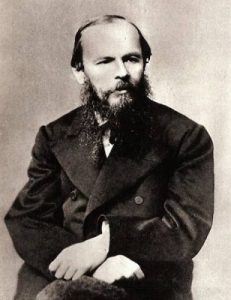
Fyodor Dostoyevsky
Fyodor Dostoyevsky was a Russian writer, journalist and philosopher, and he is considered one of the greatest novelists in classical literature, in general, and in Russian literature in particular. Born on the 11th November 1821 in Moscow, Dostoyevsky spent his childhood on the Russian capital, together his parents and seven brothers and sisters. Dostoyevsky’s father was a doctor in a hospital for the lower classes, and his mother was a housewife; they were very well educated and cultured people, and they introduced him to many different literary genres from an early age, so he acquired a taste for reading during childhood. It was also at a very premature age that Dostoevsky made his first attempts in writing.
He studied in two intern schools, and then, in 1837, with only 16 years old, he was sent to the Saint Petersburg Military Engineering-Technical University, in order to start a military career in the areas of Science and Maths, which was against his wished and natural inclinations. Nevertheless, Dostoyevsky was able to finish his degree and in 1843 he assumed the role of Lieutenant Engineer; simultaneously, he started to dedicate himself to literature even more, at first by translating several novels, and soon after by starting to write his own stories. His first book, “Poor Folk”, was published in 1846, and it’s about the lower class population of Saint Petersburg, being this narrative inspired in the author’s daily life, since Dostoyevsky lived with financial difficulties. In fact, the inspiration in experiences and situations lived or heard in the first person would became an intrinsic characteristic of his work, since most of Dostoyevsky’s novels include moments or even entire stories based in real life situations known by the author, or lived by him personally.
With his first steps in the literary world taken with some success, Dostoyevsky quitted from his military career in order to be able to be a full-time writer.; in the same period his health, very fragile since childhood, has deteriorated, and he starting having seizures with some frequency, a sign of the epilepsy that was still undiagnosed. In his first years as a full-time writer, Dostoyevsky divided his time between the writing of romances and short stories that were published in literary magazines. It was around the same time that he was introduced to socialism, a political current that attracted him from the beginning due to the ideals and values it held.
Between 1849 and 1854, Dostoyevsky had to interrupt his writings, since he was convicted to four years of exile in a forced labor camp in Siberia, for reading prohibited articles that criticizes the Tsarist regime of Russia. After leaving the labor camp, and with even fewer resources to sustain himself, he started teaching in a primary school, while still exiled, and started writing again, namely the book “The House of the Dead”, which was inspired in his personal experience, and the first book about Russian prisons and labor camps.
In 1857, Dostoyevsky married Maria Dmitrievna Isaeva, and soon after the couple returned to Saint Petersburg, where the author continued to work on new books. Soon after, Maria would die, and only two years after her death, in 1866, Dostoyevsky published the two volumes of “Crime and Punishment”, which is considered until this day one of the most important classical novels in the history of literature. One year later, Dostoyevsky married again, this time to his young assistant, Anna Grigoryevna Snitkina. Despite the success obtained at the time with “Crime and Punishment”, the financial status of the couple was still troublesome, and was worsened by Dostoyevsky’s gambling addiction; because of this, Anna was forced to sell the most part of her belongings and they left Russia, having traveled throught Germany and Switzerland, where the first daughter of the couple would born, only to die soon after due to a pneumonia. During their trip, Dostoyevsky never stopped writing; however, in their way back to Russia, he burned all of the manuscripts he had been working on, including a first version of “The Idiot” that would later become one of his most acknowledged books, since he was afraid to face again political problems.
In 1871, already in Russia, Fyodor was born, the second child of the writer. Dostoyevsky had at the time built a solid reputation in the literary field, and he continued to publish short stories and essays in literary magazines, as well as working on his novels, among which the acclaimed “Brothers Karamazov”, published in 1879.
Despite the fact that Dostoyevsky remained almost inactive in the politics of the country, he never stopped being monitored, and on the night before the day of his death, his house was searched, due to suspects of his participation in a conspiracy against the Tsar, that were never proven.
Fyodor Dostoyevsky would die at 59 years of age, in February 1881, victim of a strong pulmonary hemorrhage. He left a rich and complete body of work, with narrative centered in the human condition and in the reality of the Russian society of the XIX century, and with strong allegoric and philosophical features at the same time. His books possess very specific characteristics which are easily identified, and make him one of the most renowned authors in the world.





